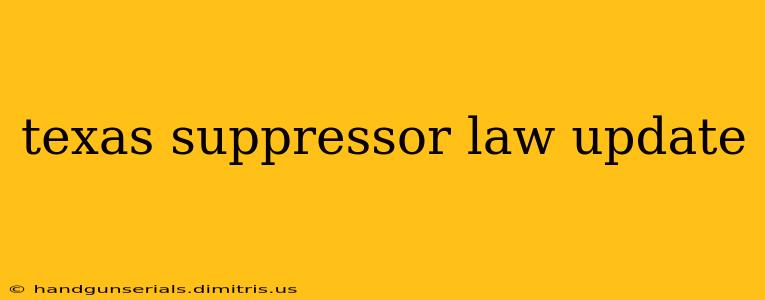Texas has seen significant changes in its suppressor laws in recent years, leaving many firearm owners unsure of the current regulations. This comprehensive guide will clarify the updated laws, ensuring you're well-informed and compliant. We'll delve into the specifics, addressing common questions and misconceptions.
Key Changes in Texas Suppressor Legislation
The most significant change involves the simplification of the suppressor purchasing process. Previously, navigating the legal requirements was complex, often involving lengthy waiting periods and multiple bureaucratic hurdles. The updated laws aim to streamline this process, making it easier for eligible Texans to legally acquire suppressors.
The Streamlined Acquisition Process
The updated legislation focuses on aligning Texas suppressor laws more closely with federal regulations. This means a reduced emphasis on state-specific permits and a more straightforward National Instant Criminal Background Check System (NICS) process. This simplification doesn't mean the process is completely without regulation; rather, it emphasizes efficiency within the existing legal framework.
Who Can Own a Suppressor in Texas?
The eligibility criteria for suppressor ownership in Texas largely mirror federal requirements. You must be:
- 21 years of age or older: This is a fundamental requirement for purchasing and possessing any firearm suppressor in Texas.
- A legal resident of Texas: Proof of residency will be necessary during the purchase process.
- Eligible to own a firearm under federal law: This includes passing the NICS background check without any disqualifying factors. This is a crucial step and any prior felony convictions or restraining orders could impact your eligibility.
Understanding the NFA and its Impact on Texas Suppressor Laws
The National Firearms Act (NFA) of 1934 remains the foundational federal legislation governing suppressors. Texas's updated laws work in conjunction with the NFA, ensuring compliance with both state and federal regulations. Therefore, understanding the NFA's requirements is vital for any Texan considering purchasing a suppressor.
NFA Registration and Tax Stamps
The NFA mandates registration of suppressors with the Bureau of Alcohol, Tobacco, Firearms and Explosives (ATF). This involves paying a tax and undergoing a thorough background check. Texas's revised laws don't alter this federal requirement; they simply streamline the state-level procedures.
Common Misconceptions and Clarifications
Several misconceptions surround Texas suppressor laws. Let's address some of the most prevalent:
- Myth: Suppressors are automatically illegal in Texas. Fact: Suppressors are legal in Texas for eligible individuals who comply with federal and state regulations.
- Myth: The purchase process is excessively complicated. Fact: While the NFA process still requires careful attention to detail, Texas has streamlined its state-level requirements, making the overall process more efficient.
- Myth: You need a special state permit beyond the federal requirements. Fact: The updated laws minimize the need for additional state-specific permits, focusing on compliance with the federal NFA.
Staying Informed and Compliant
It's crucial to stay updated on any further changes to Texas suppressor laws. Regularly consulting the Texas Department of Public Safety (DPS) website and the ATF website is recommended. Always consult with a legal professional specializing in firearms law for personalized guidance. Failing to comply with these laws can result in serious legal penalties.
Disclaimer: This information is for educational purposes only and should not be considered legal advice. Always consult with a qualified legal professional for advice tailored to your specific circumstances.

